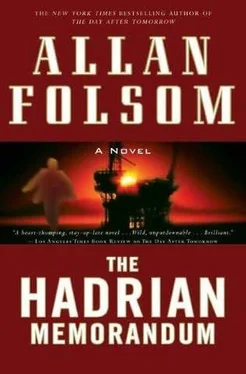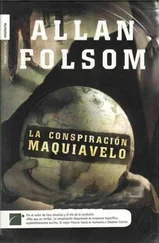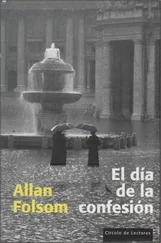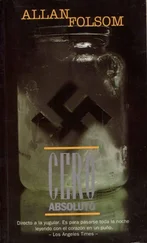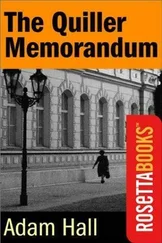Again she used the palms of her hands to wipe away the tears. “The thing is… that contract, that memorandum, belongs in the hands of Joe Ryder. He has the right to know about it and should know about it. When he has it he will act accordingly through the proper channels. Whatever else it does, the CIA cannot have its own foreign policy. Especially when the result is the horrifying deaths of all those people.” Her eyes found Marten’s and for a long moment held there. “I did it because it was the right thing to do… I didn’t mean to hurt you or frighten you or use you… Now… I’m… very… tired. I would like to… no, I need to… sleep… Please… excuse me.”
Marten found a piece of paper and made a note for himself, then folded it and put it in his pocket. He waited several minutes more, giving Anne the time and privacy to settle herself. Finally he picked up the Glock and the envelope with the 35 mm negatives and went into the bedroom.
The lamp was still on, and he could see her on the far side of the bed, under the covers with her back to him. He glanced at the clock: 3:32 A.M.
Immediately he went to the closet, punched in the combination to the safe, waited as the electronic locks slid back, then opened the door and put the envelope inside next to the photographs and the camera’s memory card. For the briefest moment he studied them all, then closed the door, listening as the electronic locks engaged. Seconds later, he set the Glock on the bedside table and turned off the light, then took off his robe and slid into bed next to her. Ever so gently he leaned over, kissed her lightly, then pulled the covers up around her and lay back in the dark, wholly drained by one of the longest days of his life. All he wanted was sleep.
Instead thoughts crept in, one overlapping another as he tried to understand what had happened. Anne’s sudden fragility, her tears and runaway emotion, reminded him of the tragic breakdown of his sister, Rebecca, years earlier when, as a child, she had seen their adoptive parents shot to death by intruders in their California home. By the time neighbors and the police found her she was on the edge of complete hysteria. Shortly afterward she had gone into deep shock, retreating into a heartbreaking world of silence where she could neither speak nor hear. Institutionalized, she had remained that way for years until another monstrously traumatic incident brought her out of it.
The stark memories of her ordeal made him recall what Anne had told him in Berlin. “My mother got very sick when I was three. She was in the hospital for a month. She didn’t recognize me or my father. Nobody knew what was wrong. Finally she came out of it. The experience scared the hell out of me. It did the same to my father. I was very young, but I could see it. I wanted so much to help him, but I couldn’t.”
Then: “My mother died when I was thirteen. It was brain cancer. She didn’t live long, but it was awful for her and my dad. Like the first time, he tried to protect me from it while he was falling apart himself. How he kept everything together-me, himself, the company-I don’t know.”
Marten’s experience with Rebecca had brought him into close contact with any number of mental health professionals. Transposing what he had learned then to Anne’s behavior tonight made him think that the seeds of it might well have been planted when she was a child. With no siblings to comfort her, her only escape would have been to hide her own emotions and focus on concern for her father. The same thing played out years later when he lay dying after a series of strokes. Again she would have put her own feelings aside in favor of his. By then it would have become a way of life; the outwardly strong, confident woman, routinely dealing with profoundly troubling issues by not dealing with them at all and instead burying them deep inside her. Shift that behavior to the present, where she faced a colossal runaway train: the Bioko field, the Striker/Hadrian corruption situation in Iraq, the Ryder Commission’s probe into it, Conor White and the creation of SimCo-involving both of her ex-husbands, no less; the photographs; the CIA video; Erlanger’s warning; the growing suspicion that the CIA was involved with Striker and Hadrian in fueling the civil war; all but confirming it, the arrival of Franck and Kovalenko in Praia da Rocha in search of the pictures and the realization that Franck was a CIA operative.
She’d been a professional, so suspicion alone wasn’t enough. She left him and went to the hotel and did what she’d been trained to do, obtain proof. Once she’d hacked into the Agency files and discovered the memorandum, she would have suddenly realized she was standing on a moral precipice. Either turn away and forget she ever saw it or risk losing her father’s company, the Bioko field, and maybe her life by photographing it, then having the film developed and giving it to Joe Ryder. Boldly, she’d chosen the latter and returned to the apartment to hand the negatives over to Marten for safekeeping alongside the photographs.
Then she’d had second thoughts. Maybe even third, fourth, and fifth thoughts. Physically exhausted, emotionally overwhelmed, she robotically reverted to the old ways, burying her feelings and focusing on something else. In this case a wild orgy of sex with him, thinking, hoping, maybe even praying it would give her sufficient release to make her clearheaded enough to destroy the negatives and perhaps the photographs, too. But it hadn’t worked; roaring and retching, a hurricane of long-buried emotions flooded out, and she came apart. Finally she was spent enough and raw enough to find the courage to do what she thought was right and give him the negatives, telling him nearly word for word what the memorandum contained. After that the only thing left was sleep.
Whether any or all of his analysis was right, there was no way to know, but putting things together the way he had along with memories of what his sister experienced, what had happened made sense. All they could do now was stay where they were and wait until Joe Ryder arrived in Lisbon and contacted them. Then they would go from there.
Again Marten looked at the clock: 3:51 A.M.
He closed his eyes and finally, mercifully, fell asleep.
3:53 A.M.
They spoke in Portuguese.
“Which floor?”
“The top one, I think. I walked around to the back. There was only one light on in the building, and it was up there. It went out about twenty minutes ago. The woman entered around midnight, the man about an hour later.”
“You’re certain it was them.” Carlos Branco stood in the darkened park across the street from the building at 17 Rua do Almada, a fisherman’s cap on his head, his jacket collar turned up against the lightly falling drizzle. The woman with him was maybe twenty. Her dark, short-cropped hair, light pullover jacket, and jeans were soaked through. She’d been outside for a long time.
“I’m certain it’s her,” she said. “I followed her from the Baixa. The man-I’m not positive it was him. I only saw him from the park, but he pretty much fit the description I was given.”
“You did well.”
“I know.”
Branco took her hand and put five one-hundred-euro bills into it. “Go home and go to bed. You were never here.”
He watched her walk off in the dark, then pass under a street-lamp and then fade again into the night. He looked back, then slid a night-vision scope from his jacket and trained it on the top floor. Even in its green glow, he saw only darkness.
3:58 A.M.
4:32 A.M.
Its headlights out, the gray BMW rolled to a stop on the far side of the park across from Rua do Almada. Seconds later a figure moved out of the dark, opened the rear door, and slid in beside Conor White.
Читать дальше
